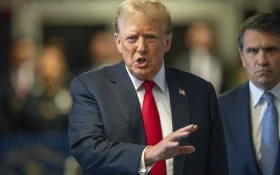Former President Donald Trump spent Tuesday sitting inside a New York courtroom, listening to the closing arguments in his hush-money trial, and awaiting a verdict.
At the same time, Trump scored a huge legal victory… 1,000 miles away.
On Tuesday, U.S. District Judge Aileen Cannon in Florida denied prosecutors’ request for a gag order in his federal classified documents case.
Cannon also chided the prosecutors for neglecting to give the defense attorneys enough time to discuss the matter. She threatened sanctions for any future cases of neglecting court requirements.
However, Cannon allowed prosecutors the opportunity to file the request again.
Prosecutors first requested the gag order on Friday, and in doing so ignored Trump’s lawyers requests to allow them until Monday to meet with their client. Prosecutors cited the “foreseeable danger to law enforcement agents” posed by Trump’s recent claims about his risk of assassination.
Trump said last week that the FBI agents who searched his Mar-a-Lago estate in August 2022 were “authorized to shoot me” and were “locked & loaded ready to take me out & put my family in danger.”
He was presumably referring to the FBI’s policy on use of force, a policy recently disclosed in a court document. The FBI allows the use of deadly force only when the officer conducting the search has a reasonable belief that the “subject of such force poses an imminent danger of death or serious physical injury to the officer or to another person.”
The former president may have used fiery language about the Mar-a-Lago search, but he never mentioned the name of any individual agent.
Still, the prosecution urged the judge to bar Trump from commenting about the officials assigned to the classified documents case.
In a court filing late Monday, the defense called a gag order unconstitutional. They also pointed to a protective order already covering the identities of the officers in this case.
The defense added that they’d asked the prosecution to meet before filing the request for a gag order, but the prosecution considered the issue too urgent.
In an email to the defense, prosecutor David Harbach described a necessity for “a prompt request for relief that could not wait the weekend to file.”
All in all, Trump is facing indictments in four jurisdictions: racketeering in Georgia, falsifying business records in New York, withholding documents in a federal court in Florida, and conspiracy in a federal court in Washington, D.C.
Trump is already under two gag orders, one in Washington and one in New York.
